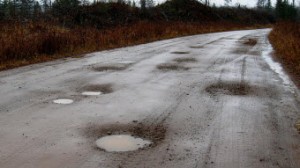Deal to fix roads reached in lame duck, but voters must approve new tax
It went down to the wire, but a deal to fix Michigan’s crumbling roads was reached on the final day of the 2014 lame-duck session.
In a testament to how leery legislators have become of raising taxes, however, voters will be asked to provide the key piece of the deal – a one-cent hike in the state sales tax, to be put on the May 2015 ballot.
Community conversations conducted by The Center for Michigan in 2014 found widespread support for raising taxes targeted to fixing the state’s roads and bridges. “The Citizens’ Agenda for 2014” found strong majorities of Michigan residents reached by the Center considered the task an urgent priority for the state, and a majority also was willing to pay higher taxes to get it done. One participant put it this way: “Employers who may want to invest in Michigan arrive at Metro Airport, drive down I-94 and break down from the potholes. I’d rather pay the government to fix roads then to have to fix my car alignment each year.”
Voters will get the chance to put their money where their mouth is in May. If approved, the state sales tax would rise from 6 to 7 percent.
The package of bills repeals the current state sales tax on gas and institutes a new fuels tax dedicated solely to roads. The one-cent increase on the May ballot would go to make up revenue to schools and cities that would be lost from the fuel sales-tax repeal.
The new fuels tax is expected to generate $1.2 billion for roads and bridges, as well as $112 million for mass transit, among other revenue.
Early reaction to the deal Thursday was positive.
Larry Merrill, executive director of the Michigan Townships Association, released a statement reading in part, “Even putting a tax increase on the ballot takes considerable courage in today’s political climate. This bipartisan solution is more attractive when compared to the potential for increased road funding coming at the expense of local governments and schools.”
Amber Arellano, executive director of The Education Trust-Midwest, a state education reform group, expressed relief that school funding would not take a hit, as had been feared with earlier proposals.
“We need to see more of this kind of creative, bipartisan leadership working together to advance the interests of all of our students and to close achievement gaps in our state,” Arellano said in a statement.
Reaching a deal to repair Michigan’s poor-quality infrastructure was Gov. Rick Snyder’s stated number one priority for the lame-duck session.
“Nobody likes our roads,” Snyder said at a press conference Thursday. “We’re seeing significant damage to people’s vehicles, and we needed to come up with a solution.”
See what new members are saying about why they donated to Bridge Michigan:
- “In order for this information to be accurate and unbiased it must be underwritten by its readers, not by special interests.” - Larry S.
- “Not many other media sources report on the topics Bridge does.” - Susan B.
- “Your journalism is outstanding and rare these days.” - Mark S.
If you want to ensure the future of nonpartisan, nonprofit Michigan journalism, please become a member today. You, too, will be asked why you donated and maybe we'll feature your quote next time!


 Gov. Rick Snyder cited the danger posed to motorists by Michigan’s crumbling roads as a major impetus for the deal.
Gov. Rick Snyder cited the danger posed to motorists by Michigan’s crumbling roads as a major impetus for the deal.